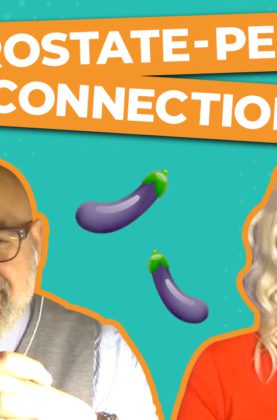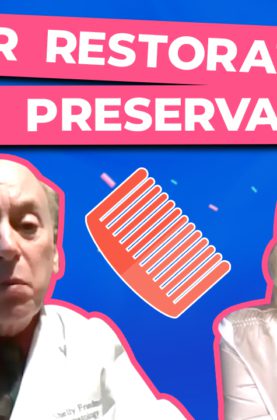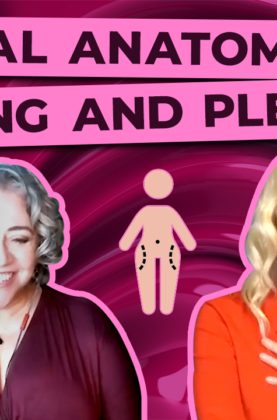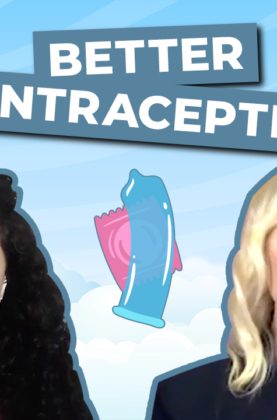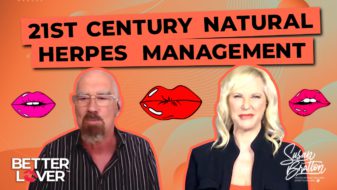Better Contraception
betterlover
Get the latest sexual health and wellness tips by email, click here. Learn more about better contraception.
Better Contraception
Transcript:
Hi, and welcome to another episode of the Sexual Vitality Summit. I’m your host Susan Bratton, and I am so happy for you to meet Dr. Jolene Brighton. I count Jolene among my dear and faithful friends and look up to her with big appreciative eyes for how brilliant she is and the fantastic work she’s doing in the world, helping women understand the impact of hormonal contraception. I’m talking about the pill and other types of contraception.
How is the pill affecting us as women our whole lives, even if we took it as young women? The downstream effect of birth control pills on our health, what it’s done or could be doing to us, and why it’s unnecessary. What you can do to reverse the damage and other alternatives to contraception if you’re using it for that. If you’re using it because your doctor has you on it for an array of issues, why is it not serving you, and what can we do to get you off that and back to health so that your body is functioning as God intended?
Dr. Brighton, thank you so much for your time today.
Thank you so much for having me and for those kind words. I adore you and refer people to your channel weekly, if not daily. You are a wealth of knowledge, and you freely share and open up conversations in ways that allow people to access the information they need.
We’ve had good sessions about non-hormonal birth control, so if you want to go to the Betterlover.com channel, you can see Jolene and me in action in our magical fairy princess outfits. I wore a tiara on that one. First, I want to have you explain what a naturopathic medical doctor is and how you combine that with your original degree in nutritional biochemistry to get to where you are now. Ladies, the pill is bad for your hormonal birth control. No matter what bill of goods you’ve been sold, it is unsuitable for any woman, and here’s why.
Start with who you are and your journey to this very bold statement. You alluded that I’m a huge nerd, so my first degree is in clinical nutrition. I had a solid background in science, and I came to recognize I lacked the philosophy and respect for the body’s innate ability to heal. I married the two taking that scientific background to naturopathic medical school. We learned people think it’s black and white. These are natural people. They only use natural pharmaceuticals, which are not factual. We concurrently learn nutrition. We know herbs and pharmacology simultaneously, and our approach is the best tool for you. If it’s a pharmaceutical (we choose the pharmaceutical in mind), what do we need nutritionally? What must we do about your lifestyle to minimize the side effects and support your body at the root cause? We weren’t born needing drugs. I am grateful we have pharmaceuticals because they have a time and place. However, instead of passing you a pill and saying we’re done here, it may be giving you a pill and saying, let’s think about how we can get you off this in the future.
That’s perspective about getting to the root cause, understanding what is going on, and respecting that we have these tools and there’s a time and a place to use each. I like the analogy that if you need a hammer for your deck and go to the shed, you’ll never be, “I don’t like hammers, so I will choose the style.” It won’t get the job done.
That’s a lot of the naturopathic philosophy. What’s the best tool to get the job done, and what else can we do to foster the body’s ability to do what it should be doing naturally? Does that all make sense?
Your book has had incredible acclaim. You have done so well with this, and every one of my friends writes a book, so I read a lot for my followers. I do a lot of book reviews and read many books that come out on sexual health and wellness.
This extremely well-written, well-organized, inspiring, motivational, and supportive book walks you through unwinding, explaining why your theory of the pill is bad for you. There are better alternatives. Here’s how you get off it and unwind it because the pill is no good for all these things. You think you’re taking it for regulating your periods, polycystic ovary syndrome, endometriosis, and perimenopause.
Can you walk us through the reasons why you decided you wanted to write a book to tell women that they should get off birth control categorically? There’s no reason to be on it. That’s a bold statement.
Let’s start with that first, then go from there. What’s funny about you saying who’s your editor is that when I turned in the manuscript, I got a letterbox saying we could publish this today. I’m an A-type personality, which is why many research studies are cited within the book.
We can recognize that hormonal birth control was designed only to impact our reproductive system, but like your natural hormones, these synthetic hormones impact every single system in your body. What I sought to do in the book is give informed consent and help support you if you choose.
In some situations, we choose that hormonal birth control is best for us or have a medical condition. Perhaps you have a bleeding disorder, a genetic mutation that causes you to hemorrhage during your period. Perhaps, you need to be on birth control. That’s the best way to control that. How do we keep you safe?
The ironic piece of this entire story is I spent two years in a homeless youth clinic dispensing birth control. When I rolled out of that and started my private practice, I told my husband I wouldn’t talk about birth control anymore.
I’m over this conversation. When I set out to write the book, he laughed and said remember that time you said you’re not going to talk about birth control anymore?
I got the reputation in my private practice of being the doctor who believed women’s birth control stories when they had side effects. When they struggled to come off of it, their doctors said it was unrelated to birth control because birth control only impacts our reproductive system. At least, that’s what doctors are being taught that propelled me to go into the research.
I found there was so much I was never told about hormonal birth control, how it impacts your gut health, how it impacts your mood, the ways that it impacts your liver that are downright scary, and how some of us lose our libido and never see it come back because of genetic alterations.
That inspired me to write the book. There are a lot of books out there about women’s health, hormones, autoimmune disease, and gut health. I did not see the conversation about birth control. We weren’t allowed to talk about it. We weren’t allowed to question it because we should say thank you for having access to this and not question it.
What about long-term studies? We lack an understanding of how hormonal birth control impacts us. There was a statement made in Scientific America recently made by many clinicians in the field, including myself, that birth control is the longest-running uncontrolled study.
It’s a medication introduced to the population, and we haven’t been questioning it. What happens when women stay on birth control for decades on end? As we age, we’re starting to see that we gals are at the highest risk for Alzheimer’s and dementia.
No one’s questioned what role hormonal birth control plays in that. We can get into the brain science around that in terms of how it impacts mitochondrial health, how it impacts inflammation in the brain, and how these synthetic hormones don’t contribute as your natural hormones do to neuroplasticity and regeneration of healthy tissues in the brain.
I want to get into all the downstream negative impacts of taking the pill on our health. Before I do, I want to talk about non-hormonal birth control. You and I see eye to eye on this, and I want you to talk about the alternative to taking the pill.
How do you protect yourself safely and healthily after taking the pill? What are the non-hormonal birth control methods you feel are good for women today for pregnancy prevention and step one? If you come off of birth control, you’ve got to have a backup method. I can’t tell you how many women have been in their 40s, and they’re like, I’m in my 40s. I can’t get pregnant. I’ve had 48-year-old patients get pregnant because the side effect of getting healthy is you get fertile. After all, a healthy female body in your fertile years will be fertile.
If you are outside your fertile window, don’t worry about that. You are in a different life season, bringing different wisdom. I am very grateful that these women are in our community now. Without getting pregnant in the first place, people’s minds go-to is a barrier method. I get a lot of eye rolls when people say I don’t want to use condoms. Condoms today are very different from the condoms of the 1970s. Many choices and materials can be more compatible with your ecology, delicate tissue, and propylene.
I recommend polypropylene, a non-latex condom you can use during your fertile window. You can use it with oil. It doesn’t get broken down when you use organic sweet almond oil, avocado, or coconut oil as your sexual lubrication. Those work hand in hand during your fertile days.
I want to note that. Suppose you’re struggling with vaginal dryness, which is common for women on hormonal birth control. We often hear this is only an issue as women age, but at any stage of your life, women can struggle with vaginal dryness for various reasons. There can be issues with vaginal atrophy. That is thinning of the tissue. This can occur post-menopausal but also while on birth control because those hormones differ. They’re not stimulating the tissues the same. I talk in the book about one of the best natural ways you can help boost the health of your tissue is Vitamin E suppositories, which is as simple as getting 400 IU—of vitamin E.
Go to the drugstore and make sure about its quality. You poke a hole in the top and insert it. If you’re using any other kind of condom, like latex, that will break down the condom. You’re not getting protection, but with these other synthetic new materials we have, we don’t have to worry about that. You can use that therapy and not worry that this is going to break down the efficacy of the condom. This matters for pregnancy prevention and sexually transmitted infections that can lead to many problems.
Depending on your relationship status, you may want to consider condoms outside of your fertile window as a mainstay. To your point, we can only get pregnant one day out of the month. This was an eye-opener.
I didn’t learn this until I was in medical school; if you think back to when women learn this, it’s usually not until they want to get pregnant. There’s a whole lot of us who never want to have a baby. What about the women who don’t want to have a baby? Your egg is only fertile, healthy, and viable for 24 hours. Sperm is tricky. Sperm can live five to six days. That means our fertile window can be five to six; sometimes, even a week is counted.
What are we talking about with the fertile window? We’re talking about the time of the month you abstain from penetration, a penis entering the vagina that could have ejaculated.
You can do other things, as you talked about in our video series. This is an opportunity you can explore. I’ve had patients who’ve said when we get to the fertile window, their sex life improved because we tried things that we wouldn’t have normally tried.
Because we didn’t feel like using a condom or getting a diaphragm, we did other things. The other three weeks out of the month, you’re not fertile. It’s free reign. You can have unprotected sex, but it means you’re not using any method to prevent pregnancy. I would say one thing about that. I’m a proponent. If you are in a heterosexual relationship and having frequent sex with your partner, his semen is very good for you.
I like the idea of using a condom or abstaining from intercourse during your fertile window but having unprotected sex all the rest of the time. He’s giving you up to 25 wonderful things that are symbiotic and helpful for you as a woman, from his semen into your vagina.
That vaginal mucosa is like a sponge. It sucks up serotonin, luteinizing hormones that regulate your period. Zinc testosterone gives you courage, things that lower your brain fog, increase neuroplasticity, help you feel better and confident, and help you feel happier and grounded. That is a man’s gift to a woman—one of many.
This ability to have that experience is very healthy for you. We were designed to work together on this to that point; ancient philosophies have said that the female when she accepts a man’s semen, she’s taking energetic potential. That’s how it is in physics. We would say chi or jing if we were talking about it in more of that metaphysical approach.
You touched on zinc being present. It’s also depleted by hormonal birth control. That’s one way we can increase our zinc stores. You’re going to want to eat your oysters because that’s going to help your libido. That’s not a myth. It’s true, ladies.
How do we get dialed in on the fertile window? We need to practice the fertility awareness method and basal body temperature. It’s also paying attention to your signs and symptoms if your libido increases. You are a cyclical female on a roughly 28-day window of cycling. We thought you were going to have times when your libido rises. You better bet that ovulation is going to follow. If you’re in the mood, we’ll see the fertile cervical mucus like that egg-white consistency. A raw egg white will show up, and your basal body temperature will spike.
Nowadays, it is much easier than taking charge of your fertility if you want to get dialed in on this. That’s an excellent book. However, I could improve at paper charting, and most women are not very good at paper trading in our digital age, and now we have Femtech devices like Natural Cycles and Daisy. You can take your temperature in the morning.
It correlates the data against other women in the population to help dial in a lot sooner, and it’s leveraging math to help you understand when you can get pregnant, which is very novel in this day and age to be like mathematics is outwinning hormonal suppression which is what birth control is. It’s suppressing your natural hormones. Yet we can use math to dial that in. When you’re working with your cycle, you’re gaining.
What are your symptoms, and what do they mean? That’s in chapter four of my book. This might happen if you have these issues, signs, and symptoms. Here’s where we need to work. Here’s how to talk to your doctor. Here’s what lab testing you need to have done and what you can do now to feel better.
I want to point out something about the fertility awareness method. You’re figuring out your fertile window. When you need to use additional contraception, it tracks your temperature. When you’re about to ovulate, your temperature rises so that your system can tell you that you’re about to go into ovulation, drop an egg and be fertile. An egg drop is like a mic drop boom.
It’s different. The daisy. What was the other brand called? Natural Cycles are these little devices. I have a brand new one coming in the mail because they came out with 2.0. Daisy is a little device. They’re tiny things with a thermometer you put under your tongue that talk to your phone, an app on your phone that can tell you predictively when you’ll be fertile.
You can take other alternative precautions like using a condom or a diaphragm or any barrier method or abstinence during that small window of the month when you could conceive so you don’t. That’s one way.
There’s another option for non-hormonal birth control. There’s also the copper IUD. If you’re somebody like that, I don’t want to worry; I hear that. You might be a good candidate for a copper IUD. A copper IUD can work for some but not all women. Who does it not work for?
If you have a history of painful or heavy periods, that can get much worse. This can happen in perimenopause, where sometimes women have periods that last two weeks or more. That is not normal. There are lots of things in common, and because your doctor sees these things, often they may think they’re normal, but the only thing that matters at the end of the day is what is normal for you.
It’s a good time to visit your doctor with the copper IUD. This is the most affected, effective, and loved form of contraceptive.
When it works for women, women love their copper IUDs. There are so many benefits to having the copper IUD. You don’t have to think about it. That can help with spontaneity, an important aspect of women’s health. To be able to be a sexual creature, orgasms are phenomenal. We can discuss the benefits of orgasms; I go into those extensively in my book because they’re essential for our health.
The other thing with the copper IUD is the failure rate is so low. It can happen, but it’s so low in terms of having sex that we see very few women get pregnant. Compared to the pill, many more women, about 9 out of 100 women, will get pregnant while using the pill.
If you’re using the copper IUD, we’re talking less than one in a hundred; we’ll get pregnant using the copper IUD. The efficacy rate is very high. Any time you elect for medical intervention and a copper IUD or hormonal birth control, all these forms are a medical intervention. You must track your data. I recommend that women spend at least a month writing down how they feel daily, from how their mood and joints move to how their digestive tract works.
If you are cycling, what’s going on with your periods? What’s going on through your menstrual cycle before you have that intervention? It’s a good idea to get baseline labs. In the current medical paradigm, we test in labs when we have symptoms. The only way to know your true baseline when you’re healthy is to get your labs tested and see where they’re at. This is important with the copper IUD because I have seen with some women that inflammation markers go up nowhere near where inflammation goes up while on hormonal birth control pills.
However, that can happen. I’ve also seen thyroid change for a cardiovascular event, a tiny percentage that this happens. You need to know that getting these baseline lab tests and circling back and re-testing in about six to eight months can be beneficial to answering the question.
Is this the right thing for me? What labs do you get C reactive protein, a marker of inflammation? CRP is what it’ll look like in the lab. I prefer HSCRP. That’s highly sensitive, so that will be a lot more dialed in for cardiovascular health, getting a full thyroid panel and getting TSH-free T4 T3, measuring your antibodies because for women, when we introduce hormonal birth control or copper IUD.
They work partly with inflammation; we can see TPO or thyroglobulin antibodies switch and turn on. This is the most common form of autoimmunity that impacts women. Sadly to say, I have Hashimoto’s myself. Regardless of what you’re doing for birth control, you should monitor this annually.
We should have this test because the antibodies will appear before the symptoms. It’s important to get a reverse T3 called the hibernation hormone. If your body is experiencing stress, it will deactivate your T3 mechanism. That’s your mood, your metabolism, your menses. It will instead reverse T3, which is a hibernation hormone, because you will gain weight.
You will get cranky and will want to sleep all the time. You’re a bear in winter. Nobody should mess with you. You are getting that tested along with a CBC. The complete blood count will tell us about your red and white blood cells. Ensure we look at a comp metabolic panel and understand your electrolytes and liver health. These are liver enzymes; very important to understand those and get a nutri-eval, an organic acids test, or a spectra cell test, which looks at your nutrient status.
You can look at these minerals. I was talking about copper and zinc, but we also want to pay attention to our minerals and overall nutrient status to ensure we do not have adverse changes. Those are some baseline testing that you can get at any doctor’s office. These are standard blood tests that you can get.
I want to go into all of the problems that the pill causes. I have this issue, and my doctor told me I need the pill for it. That’s the steps I want to take for the next few minutes, so can you talk about your hormone reboot plan? It’s the hormone-balancing starter kit.
Why do most of us end up on birth control for symptom management? We’re going to talk a lot more about that. You, ladies, want to hang in for that one. With that, this kit provides a seven-day meal plan that will support you if you’re on hormonal birth control because it depletes nutrients like crazy. If you’ve never even used hormonal birth control and want to optimize your estrogen, progesterone, testosterone, insulin, thyroid, and cortisol levels, we all want that. It’s got a meal plan and recipes to guide you in that.
They are all gluten-free. We’ll mess around with that in my world. In addition, it will give you information on how you naturally boost your progesterone and optimize your estrogen levels so that we can goldilocks this business, not too much or too little.
How can you reign in that stress which will sabotage your other hormones? Please don’t eye roll on me, ladies, because the stress for real messes with how your brain communicates with all of your glands. In doing that, we can make more cortisol which can lead to more belly fat which can also lead to us destroying brain cells over time. We don’t roll because we always talk about stress, but we don’t know what a stressor is and how that impacts my body.
I’m going to teach you all of that there. I will give you an array of ways to reduce your stress so that you can find what works best for you because meditation might work well for your best friend, but for you, a walk in the park does it for me. I don’t want to sit there in silence. There’s no right or wrong. There’s what is true for you and what works for you.
Thank you so much for providing the on-ramp to get started in reversing the damage the pill has or is having in your life. Let’s start with the checklist. I’ve heard you often speak because I love listening to you. I listen to almost every interview you do because what you’re saying is so important. When you rattle them off, you can get it.
Please take one and the next one. Sometimes they’re a little technical, so I want you to unpack them as we go. We have probably ten solid minutes to devote to all the impacts of taking the pill on your body. I want any woman to be able to recognize how she’s being impacted and be able to say that might be coming from me taking the pill. That’s where I want to start with this.
Let’s go through the list of how taking hormonal birth control pills hurts us, and hormonal IUDs are another thing. What are other hormonal birth control if you’re on the Mirena or these other products? Is there anything beyond that?
There’s the pill, the patch, the ring, the IUD, the Depo shot, and the implant.
Feel free to jump in because we want to ensure women get this information. First, we must understand that we include a molecule, a fake hormone called progestin when discussing birth control.
Progestin gets passed off as progesterone, but you make progesterone, and nature can make progesterone, where we get our bioidentical progesterone cream when I talk about birth control, ladies. BHRT is what it gets called is nothing like the synthetic hormones of birth control. When women often hear this, they think my bioidenticals are bad. Your bioidenticals have a lot of benefits that birth control does not have. When you understand that progestin is not progesterone, you are way ahead of the curve of most scientists and doctors in this conversation.
Why does this matter? Women often tell me my book is about the pill, so it doesn’t apply to my IUD or Depo shot. We vilified synthetic estrogen for a long time, thinking this was the main troublemaker. Then, studies showed us that progestin also increases the risk of breast cancer.
If you’ve ever heard that progesterone puts you at risk of cancer, the studies were likely looking at progestin. Yet the news media or the researcher misreported it as progesterone. We know that progesterone has benefits and is anti-carcinogenic, which means it doesn’t cause cancer.
The other benefit of progesterone is it chills you out. It stimulates what are called GABA receptors in your brain. When the panic button goes off, the siren goes off in your brain. GABA says, “Shh, it’s going to be okay, and let’s just chill out for a second. Only progesterone does that. Progestin does not do that, so if we have anxiety when we start hormonal birth control or as part of coming off of it, it may be an issue with progesterone levels a lot.
It’s estimated that over 40 million Americans struggle with anxiety, most women. We must understand that anxiety is a big issue, and our hormones can play a tremendous role. For some of you listening, if you’re having trouble sleeping, having hot flashes, night sweats, and feeling anxious, your doctor may prescribe oral progesterone, a bioidentical, because that impacts the brain.
It can help you feel chilled out and in love with your life. The women listening may not know this. I have had head injuries that I’ve recovered from, and progesterone has been shown to have tremendous benefits in both women and men for regenerating brain tissue. It helps with neuroplasticity and keeps your immune system in check. What is neuroplasticity? You can form new connections in your brain and learn new things. It may be easier for a two-year-old to learn Spanish, but a 50-year-old, a 90-year-old, can learn Spanish because of neuroplasticity.
A lot of what we thought about the brain was wrong. Your brain cells are gone. They’re gone for good. You’re never going to get them back—your brain ages. Guess what? Your hormones protect you. However, progestin does not.
It alters the female brain at the structural level and may upregulate free radical production. We hear about free radicals. A lot of feminists are depleting the antioxidants that combat free radicals. Free radicals are molecules that rip apart a cell in a frenzy. Vitamin C and E protect you, and so does glutathione.
While on hormonal birth control, you deplete the nutrients you need to make glutathione, like selenium, essential for thyroid health. You deplete vitamins E and C, so you can’t protect the brain this way. It’s critical to understand these differences in progesterone versus progestin. When you know this, you can understand why you feel terrific when you start bioidentical progesterone.
You might feel like a crazy person if you start something like the pill. You get the patch. You get the NuvaRing. You have a depo shot. You have an implant in your arm because all these have progestin. When talking about hormonal birth control and its adverse side effects, all hormonal birth control is on the table for this.
We have to have this dialogue. There’s new research being conducted as we speak. It won’t be out looking at the long-term impacts on the female brain for a while. This is important because, as we discussed initially, we’re at the highest risk. Over 66 percent of Alzheimer’s patients are women.
We must question our hormones’ role in whether these are natural or synthetic. In the case of hormonal birth control, we don’t know what happens when a woman in her teenage years is put on birth control and doesn’t come off of it until her 40s in terms of her brain health.
That’s the tip of the iceberg with brain health because of other concerns. For a long time, women were being prescribed hormonal birth control if they lost their period or had lower estrogen levels because there was a concern about the loss of bone mass, and there was this thought that if we gave you birth control, it would improve your bone mass and it would protect your bones.
A recent study shows that was never true, and in fact, it’s your natural estrogen or bioidentical estrogens. It takes very little bioidentical estrogen to protect your bones. I want women to understand the way hormonal birth control is designed. Is it a high enough dose? When discussing the pill specifically, is it a high enough dose you swallow? Your liver goes through the first pass as it does with all medications.
It attempts to detoxify it. However, so many hormones get through that it shuts down how your brain and ovaries communicate. It’s shutting down brain-ovarian communication altogether. It takes a lot of hormones to be able to do that. Your doctor may have said to you you’re on low-dose birth control. That’s because, comparatively speaking, the first pill killed women because it was such a high dose and increased the risk of stroke and heart attack that we have a lower dose.
It’s still a high dose of hormones, comparatively speaking. What we need to use topically for bioidentical progesterone and estrogen to protect our health is so much lower than hormonal birth control. We have to look at it through the lens that it is increasing many risks here: the risk of heart attack, a stroke which only increases as we age. It’s not having the same benefit on our bone mass that we once thought it did.
In my practice, if I have a 20-something-year-old female who has amenorrhea which is loss of menstruation that may be due to her brain not talking to her ovaries or having primary ovarian insufficiency, her ovaries are not working. We opt for bioidenticals before we ever go down the route of synthetic birth control because the side effects and risks are too great compared to the benefits.
There’s a lot more I want to say, but I want to see if there’s anything we want to unpack from that or more information I can provide. I heard you say that there are a lot of reasons. It seemed that you were talking about most women in perimenopause menopause who have hormonal deficiencies and are given the pill to fix the problem. You’re saying you should use bioidentical hormone replacement or unusual cases where younger women were not producing their hormones.
You want to get to the root cause of why that’s happening, not just us allegedly fixing this problem. There are a lot of women that are past the pill, and this is what upsets me the most. Many women are given hormonal birth control without discussing what’s going on with their bodies, which happens at all life stages.
I think that perimenopausal and menopausal women do not discuss what can be done naturally where they’re at in their stage of life if we know that hormonal birth control decreases testosterone production. Ladies, it lowers testosterone while raising a protein called sex hormone binding globulin, not your body misbehaving. It adapts to the high dose of hormones you take with birth control. It’s meant to keep you safe. The trouble is it binds up your testosterone. What happens when we bind up our testosterone? We don’t wake up, kick ass and repeat. That is something that testosterone is involved in our mood. If you’re crying all the time, you’re struggling with energy. It may very well be your testosterone.
I have certainly been there, so not shaming anybody, but you do the wave, and your arm keeps going with the waves so that tricep is feeling a little bit flabby, for lack of a better term. That could be low testosterone. It also could be a thyroid issue.
This is often where women are told they have weight issues, eat right, and exercise. That’s your issue, but the reality is that as testosterone declines, our muscle mass declines. As our muscle mass declines, our metabolism declines. One of the best ways to get your metabolism up and burn more calories is to increase your muscle mass by lying on the couch and doing nothing.
You can’t do that without testosterone, and you certainly can’t do it without proper insulin sensitization. Insulin is a hormone that’s made in your pancreas. It docks onto cells to let the glucose in. When you’re on hormonal birth control, you are inflamed. Some studies have tested women. They put them on birth control and found that their CRP c-reactive protein was three times the rate before. The levels are three times higher. That means that you’re inflamed. If you’re inflamed, no hormones can get onto your cell receptors, be taken in, and do their job.
The cell becomes rigid. It increases the risk of insulin resistance. This is how we develop diabetes. Interestingly, as I talk about in the reversing metabolic mayhem chapter of my book, women who have a history of six months or more on hormonal birth control have over 35 percent increased risk of developing diabetes as they enter into menopause. An increased risk of having ever used hormonal birth control, which tells us these changes they’re not short-term changes of being on it. The long-term implications of using hormonal birth control and diabetes are a big deal, as we can all recognize.
It can lead to all sorts of issues, like vision changes, changes in kidney function, and changes in nerve sensitization, which can lend itself to changes in the pelvic floor. I want to loop this in with the testosterone issues because if your muscles are atrophying, they are shrinking. They’re minimizing. What’s happening in your pelvic floor? Like your bicep, your pelvic floor is a use-or-lose-it muscle. This is one reason why orgasms and sex are great for women. It allows you to use that muscle and strengthen it. When we have lower testosterone, or we’re on hormonal birth control, we can see that the tissue shrinks. We’re at higher risk of vaginal atrophy.
We’re at higher risk of yeast infections. Developing infections will make you not want to have sex. In addition, it may be challenging to achieve an orgasm, and your orgasms may not be as satisfying; that can come down to what’s going on with the pelvic floor because of testosterone or the issue with your blood sugar issues.
These sugars start to destroy the nerve endings. We have a loss of sensitization in the clitoris. This can also happen in the penis. Whenever men complain of erectile dysfunction or other sexual issues, we must look at cardiovascular health and blood sugar regulation.
This is something that I want women to walk away from and understand your libido, your ability to achieve orgasm, the health of your orgasms, or the quality of these are all signs of your health. They are markers of vitality.
The old story of women’s medicine is that women have difficulty achieving orgasms. If a woman has a libido, that’s like a unicorn in the forest you came across. The research has shown us none of that is true. I want women to understand that as we look back at women’s medicine, there’s a lot we still don’t understand about the human body. It’s a fascinating time to be a woman.
We discovered the clitoris is a giant structure, but it also needs healthy blood flow. That is something that hormonal birth control, shifting your cardiometabolic system can impede, and putting on birth control, the more likely we are to experience sexual dysfunction and not just later in life.
That can come on within months of being on birth control. We can get ourselves into a loop where sex is painful; being an organism, all organisms try to avoid pain. You’re practicing pain avoidance. We have dysfunction in our relationship and the root cause. As I discussed in my libido chapter, libido is often multifactorial because it’s how it started. There’s the journey of adapting as an organism not to have pain, not to engage in these things that are uncomfortable or leave you feeling dissatisfied.
I want to see if we can unpack anything about that before I talk about gut and liver health. Unfortunately, we can’t get into that level of detail because of our time frame, so maybe close it off with a sentence on each so that people understand how to dive deeper into that.
In the last two minutes, I want to address polycystic ovary syndrome and endometriosis, common issues with women, and the pill’s impact on those particular issues, as promised.
With your liver, it alters your liver at the genetic and structural levels. While on hormonal birth control, you’re at higher risk of developing benign liver tumors that can rupture and at higher risk of having that sex hormone-binding globulin elevated for life, robbing you of your libido.
Regarding gut health, hormonal birth control causes intestinal hyperpermeability, a leaky gut. Because of that, it is associated with a 300 increased risk of developing Crohn’s disease after five years of birth control.
If you have a family history of Crohn’s or ulcerative colitis, not to mention when you have a leaky gut, you have a leaky brain, and you start getting brain fog and lose cognitive function.
You do a beautiful job in the book. I recommend that Jolene’s words start to resonate with you. This could be the root cause of my problems; pick up her book. It’s a beautiful read; she breaks everything down in a very organized way for you.
Let’s finish up with PCOS and endometriosis, which seems a massive issue for women in today’s modern era. In my generation of younger women, in my 20s and 30s, I didn’t even hear about these, and now everywhere you go, women are complaining about these problems. Let me know if I’m missing anything that’s a big issue.
Polycystic ovarian syndrome, for women who are not familiar with that, it’s generally called PCOS. It is a metabolic disorder. That means it’s rooted in inflammation and insulin dysregulation. These women experience irregular periods. They also can have acne, cystic hair growth on their chin, chest, and abdomen, and hair loss on their head. Nobody likes that, and hormonal birth control can help with those symptoms. However, what it does not do is address the root cause. It can make the root cause a whole lot worse.
Women with PCOS are at higher risk of stroke, heart attack, hyperlipidemia, elevated cholesterol, high blood pressure, and diabetes. Birth control makes all of that a whole lot worse. While a woman will be past hormonal birth control, and her doctor will say we fixed your period; now you have regular pill bleeds because it’s not an actual cycle without ovulation.
Nobody follows up with her on diabetes and cardiovascular issues. If you already have a cardiac metabolic disorder, you are at much higher risk in the general population.
Hormonal birth control was never designed for a woman with a pre-existing condition. It was designed for young, healthy females who didn’t want to get pregnant. With PCOS, your acne might get better. You may stop losing hair on your head, although some start losing more depending on birth control.
If your doctor’s not monitoring the same labs, we talked about before, inflammation and, in addition, fasting insulin and hemoglobin AC1, which is a marker of your blood sugar over the last three months. It takes an average much better than getting a one-and-done glucose test where you’re fasting, but if your doctor’s not monitoring, you can be at high risk for the significant scary side effects that we know of with birth control.
The other issue is that you may find when you come off birth control, you’re unable to conceive. Yes, you had a pre-existing condition that would make it more difficult to conceive, but you may have also layered additional issues using birth control and delayed conception.
Endometriosis is an area where research still needs to do its due diligence in women’s health. We don’t have significant funding for PCOS or endometriosis, and we must remember that one in 10 women is estimated to have endometriosis, so it’s not rare.
We don’t know the root cause because we must study it sufficiently. When we start talking about endometriosis, here’s what we do know. We know there is an estrogen component, as in all inflammatory conditions. Again, Goldilocks. Just the right amount can help you have your immune system in check, but too much or too little estrogen can cause the immune system to flare.
Endometriosis looks more like an autoimmune disease, meaning it will be rooted in gut health. There will be immune system dysregulation, and there will be inflammation. These are the areas that we need to address. However, you are not just having the worst period of your life when you have endometriosis. You have periods that feel like they might kill you.
These women are writhing in pain, sometimes ten days out of the month to 21 days. They can have pain with urination. They can have pain with bowel movements because there’s tissue similar to the lining of your uterus that has made its way into different areas of your body. It will be stimulated by estrogen to increase. It can bleed when those hormones drop.
When a woman has her period, she might have bleeding in other places of her body, which can cause a lot of pain because the immune system has to come in and clean that up. That’s a problem there. When discussing endometriosis, I like women to understand that this is a chronic pain issue.
Women are dismissed. This is in the research at the highest rate, compared to men regarding chronic pain. If you are one of those women experiencing chronic pain, please do not stop advocating for yourself. You deserve to know the root cause and have that symptom management. This is where that naturopathic philosophy comes in.
I want your symptoms managed at the same time that I want to work on the root cause because what does it take to do the root cause of the medicine to heal your body naturally? It takes energy and effort; if you are in that much pain, you won’t be able to put that energy and effort in.
These women may be suitable candidates for hormonal birth control in the short term. Why the short term? Because if this is rooted in inflammation and autoimmune disease, I’ve already told you that hormonal birth control is inflammatory and messes with your gut health, causing intestinal hyperpermeability. We have to frame it so that it’s not a long-term solution, but it may be a quick fix while you work on that long-term.
There you go. That is an initial overview, as you can see. It’s a highly complex scenario. Dr. Jolene and other naturopathic physicians like her who work in women’s wellness, functional medicine doctors, and others are empowered and know to get to the root cause of the problems created by hormonal birth control or that aren’t necessarily fixed by it in the long run.
I hope we’ve given you ideas about non-hormonal birth control with the fertility awareness method, some of the new sex technologies you can use, and the possibility of a copper IUD as an alternative solution. My daughter uses that and has been perfectly great at it for the five years she’s had it. There are great alternatives for you and excellent areas of support. I hope you’ll check out DR. Jolene’s gift to get on to a new wellness plan. I’m your host, Susan Bratton, and I’ll see you on the other side.


